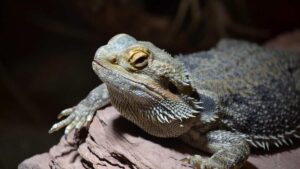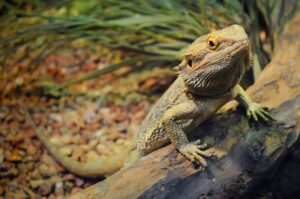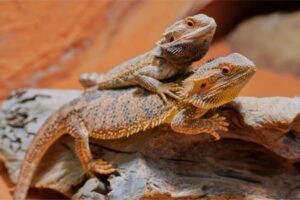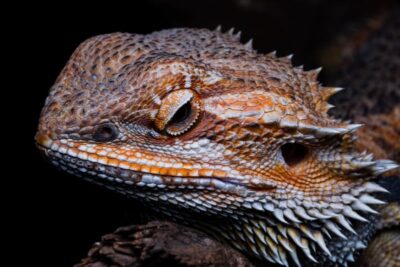Curious about the dietary preferences of your bearded dragon? Wondering if eggs should be on the menu? ‘Can bearded dragons eat eggs?’ is a common inquiry among reptile enthusiasts. Let’s dive into this question to uncover the facts and ensure your scaly friend enjoys a healthy and balanced diet.
Yes, bearded dragons can eat eggs, but it should be done in moderation and with certain considerations. Eggs can be a nutritious treat for these reptiles, providing essential proteins and fats. However, it’s crucial to prepare them properly and offer them as an occasional supplement to their main diet of vegetables and insects.
Hard-boiled or scrambled eggs without seasoning are safe options. Remember to monitor your bearded dragon’s intake and consult with a veterinarian if you have any concerns about their diet or health.
Understanding Bearded Dragon Nutrition

Understanding bearded dragon nutrition is vital for ensuring the health and well-being of these fascinating reptiles. Bearded dragons are omnivores, meaning they eat a combination of animal and plant matter. Their diet should consist primarily of vegetables, fruits, and live insects, with occasional supplementation of other protein sources like eggs. Here are some key points to consider when it comes to their nutrition:
- Protein: Bearded dragons require a balanced intake of protein for muscle development and overall health. This protein primarily comes from live insects such as crickets, dubia roaches, mealworms, and silkworms. These should be the main protein source in their diet.
- Vegetables and Greens: Leafy greens and vegetables should make up a significant portion of a bearded dragon’s diet. Offer a variety of vegetables such as collard greens, mustard greens, kale, dandelion greens, squash, bell peppers, and carrots. These provide essential vitamins, minerals, and fiber.
- Fruits: Fruits can be offered as occasional treats due to their higher sugar content. Suitable options include berries, apples, mangoes, and melons. Remember to remove any seeds or pits as they can be harmful.
- Calcium and Vitamin D3: Bearded dragons require calcium for bone health and proper muscle function. Dusting their food with calcium powder, especially on live insects, helps prevent metabolic bone disease. Additionally, they need exposure to UVB light to synthesize vitamin D3, which aids in calcium absorption.
- Hydration: Proper hydration is crucial for bearded dragons. Provide a shallow dish of fresh water for drinking, but be aware that they may not drink from it regularly. Additionally, misting their enclosure or offering baths can help maintain hydration levels, especially for younger dragons.
- Supplementation: Depending on the diet and the health of your bearded dragon, supplementation with vitamins and minerals may be necessary. Consult with a reptile veterinarian to determine if supplementation is needed and in what amounts.
- Avoid Feeding: Certain foods should be avoided as they can be toxic or harmful to bearded dragons. These include spinach, rhubarb, avocado, and foods high in oxalates or phosphorus.
By understanding and providing a balanced diet that meets their nutritional needs, you can help ensure that your bearded dragon remains healthy, active, and vibrant throughout their life. Regularly monitoring their diet and consulting with a reptile veterinarian can help address any nutritional deficiencies or health concerns promptly.
Can Bearded Dragons Eat Eggs?
Yes, bearded dragons can eat eggs, but it’s important to offer them in moderation and with certain considerations. Eggs can provide a nutritious source of protein, fat, and other essential nutrients for bearded dragons. However, they should be cooked and offered as an occasional treat rather than a staple part of their diet.
Hard-boiled or scrambled eggs without any seasoning are safe options for bearded dragons. It’s essential to avoid adding any salt, spices, or cooking oils, as these can be harmful to your pet. Additionally, make sure to remove the eggshells before feeding, as they can pose a choking hazard.
While eggs can be a healthy addition to a bearded dragon’s diet, they should not replace their primary food sources of vegetables, fruits, and live insects. These items provide a more balanced nutritional profile for your pet.
As with any new food introduction, monitor your bearded dragon’s response to eggs. If you notice any digestive issues or adverse reactions, discontinue feeding eggs and consult with a reptile veterinarian for further guidance.
Can bearded dragons eat hard boiled eggs?

Yes, bearded dragons can eat hard-boiled eggs. Hard-boiled eggs can be a nutritious and convenient source of protein for bearded dragons when offered in moderation. They provide essential nutrients such as protein, fat, vitamins, and minerals.
However, it’s crucial to feed hard-boiled eggs without any seasoning or additives, as these can be harmful to your pet. Additionally, be sure to remove the eggshell before feeding to prevent choking hazards. Hard-boiled eggs can be chopped into small pieces or mashed for easier consumption by your bearded dragon.
As with any new food introduction, monitor your pet’s response and consult with a reptile veterinarian if you have any concerns about their diet or health.
How to Feed Eggs to Bearded Dragons
Feeding eggs to bearded dragons can be a simple process, but it’s essential to follow a few guidelines to ensure their safety and nutritional balance. Here’s how to feed eggs to bearded dragons:
- Selecting Eggs: Choose fresh, high-quality eggs from a reliable source. Chicken eggs are the most commonly offered to bearded dragons, but you can also consider other options like quail or duck eggs as occasional treats.
- Preparation: Cook the eggs thoroughly before offering them to your bearded dragon. Hard-boiled eggs or scrambled eggs without any seasoning are safe choices. Avoid adding salt, spices, or cooking oils, as these can be harmful to your pet.
- Cooling and Peeling: Allow the cooked eggs to cool completely before feeding them to your bearded dragon. If you’re offering hard-boiled eggs, peel off the shell and discard it before serving. Be sure to remove any remaining shell fragments to prevent choking hazards.
- Cutting or Mashing: Depending on the size of your bearded dragon and their preference, you can either cut the cooked eggs into small pieces or mash them into a paste-like consistency. This makes it easier for your pet to consume and digest.
- Feeding Frequency: Eggs should be offered as an occasional treat rather than a regular part of your bearded dragon’s diet. Once or twice a month is typically sufficient, but you can adjust the frequency based on your pet’s preferences and nutritional needs.
- Observation: Monitor your bearded dragon’s response to eggs after feeding. Watch for any signs of digestive issues, allergic reactions, or changes in behavior. If you notice any concerns, discontinue feeding eggs and consult with a reptile veterinarian for further guidance.
By following these steps, you can safely incorporate eggs into your bearded dragon’s diet as a nutritious and enjoyable treat. Remember to prioritize a balanced diet that includes a variety of vegetables, fruits, and live insects to meet their nutritional needs.
Potential Benefits of Feeding Eggs to Bearded Dragons
Feeding eggs to bearded dragons can offer several potential benefits when done in moderation and as part of a balanced diet:
- High-Quality Protein: Eggs are a rich source of high-quality protein, which is essential for muscle development, growth, and overall health in bearded dragons. The protein content in eggs can help support their dietary needs, especially when supplemented with other protein sources like insects.
- Essential Nutrients: Eggs contain various essential nutrients, including vitamins such as vitamin A, vitamin D, vitamin B12, riboflavin, and minerals like calcium and phosphorus. These nutrients play crucial roles in maintaining optimal health, bone strength, and metabolic functions in bearded dragons.
- Healthy Fats: Eggs provide healthy fats, including omega-3 and omega-6 fatty acids, which are important for maintaining skin and coat health, as well as supporting proper organ function in bearded dragons.
- Convenience and Variety: Offering eggs as an occasional treat can add variety to your bearded dragon’s diet and serve as a convenient source of nutrition. They are easy to prepare, store, and offer as a supplement to their regular meals of vegetables and insects.
- Egg Binding Prevention: For female bearded dragons, consuming eggs may help prevent or alleviate egg binding, a condition where eggs become stuck inside the reproductive tract. The added calcium from egg consumption can support egg development and laying, reducing the risk of complications associated with egg binding.
- Behavioral Enrichment: Introducing new foods like eggs can provide mental stimulation and enrichment for bearded dragons, keeping them engaged and interested in their diet.
While eggs can offer these potential benefits, it’s essential to feed them in moderation and alongside a well-rounded diet that includes a variety of vegetables, fruits, and live insects. Additionally, monitor your bearded dragon’s response to eggs and consult with a reptile veterinarian if you have any concerns about their diet or health.
Risks and Concerns
While feeding eggs to bearded dragons can provide potential benefits, there are also risks and concerns to consider:
- High Fat Content: Eggs contain a relatively high amount of fat, which can be problematic if fed excessively. Too much fat in the diet can lead to obesity and related health issues in bearded dragons.
- Cholesterol Levels: Eggs are high in cholesterol, which may not be suitable for bearded dragons with certain health conditions, such as liver or kidney disease. Excessive cholesterol intake can contribute to the development of fatty liver disease and other metabolic disorders.
- Salmonella Contamination: Raw eggs pose a risk of salmonella contamination, which can cause gastrointestinal illness in bearded dragons and other reptiles. It’s crucial to thoroughly cook eggs before feeding them to reduce the risk of bacterial infection.
- Calcium-Phosphorus Imbalance: While eggs are a good source of calcium, they also contain phosphorus. Feeding eggs too frequently without balancing the calcium-to-phosphorus ratio can disrupt calcium metabolism and lead to metabolic bone disease (MBD) in bearded dragons.
- Allergic Reactions: Some bearded dragons may have allergies or sensitivities to certain components in eggs, leading to digestive upset or allergic reactions. It’s essential to monitor your pet’s response to eggs and discontinue feeding if any adverse reactions occur.
- Overfeeding and Nutritional Imbalance: Feeding eggs too often or in large quantities can result in an imbalanced diet, where essential nutrients from other food sources are lacking. This can lead to nutritional deficiencies or excesses, negatively impacting your bearded dragon’s health.
- Shell Fragment Risks: If not properly prepared, eggshells can pose a choking hazard to bearded dragons. Ensure that eggs are thoroughly cooked, and any shell fragments are removed before feeding.
- Impact on Behavior: Introducing new foods like eggs can sometimes disrupt a bearded dragon’s feeding behavior or preferences. Monitor your pet’s eating habits and adjust their diet accordingly to ensure they receive adequate nutrition.
To mitigate these risks, it’s essential to feed eggs to bearded dragons in moderation, as an occasional treat rather than a staple part of their diet. Additionally, ensure eggs are thoroughly cooked, monitor your pet’s response to eggs, and consult with a reptile veterinarian if you have any concerns or questions about their diet and health.
Alternatives to Eggs for Bearded Dragons

If you’re looking for alternatives to eggs to diversify your bearded dragon’s diet, there are several nutritious options to consider:
- Insects: Insects are a staple part of a bearded dragon’s diet and provide essential protein and nutrients. Consider offering a variety of live insects such as crickets, dubia roaches, mealworms, superworms, hornworms, and silkworms. These insects offer a diverse range of nutrients and textures, keeping your bearded dragon engaged and satisfied.
- Leafy Greens: Leafy greens are an excellent source of vitamins, minerals, and fiber for bearded dragons. Offer a variety of greens such as collard greens, mustard greens, dandelion greens, kale, bok choy, and turnip greens. These vegetables can be offered raw or lightly cooked and should make up a significant portion of your bearded dragon’s diet.
- Vegetables: Along with leafy greens, vegetables provide additional nutrients and variety to your bearded dragon’s diet. Consider offering vegetables such as squash, bell peppers, carrots, zucchini, sweet potatoes, and snap peas. These can be chopped or grated for easy consumption.
- Fruits: Fruits can be offered as occasional treats due to their higher sugar content. Choose fruits such as berries, apples, mangoes, papayas, and melons. Remove any seeds or pits before feeding, as they can be harmful to bearded dragons.
- Commercial Diets: Commercially available bearded dragon diets can be convenient and provide a balanced source of nutrition. Look for high-quality pellet or powder diets formulated specifically for bearded dragons. These diets often contain a blend of vitamins, minerals, and other essential nutrients.
- Homemade Mixes: You can create homemade mixes using a combination of vegetables, fruits, and proteins. Blend or chop a variety of ingredients such as leafy greens, vegetables, fruits, and cooked meats like chicken or turkey. Be sure to balance the mix to meet your bearded dragon’s nutritional needs.
- Supplements: Along with whole foods, supplements can be added to ensure your bearded dragon receives all necessary vitamins and minerals. Consider dusting live insects with calcium powder or providing vitamin supplements as recommended by a reptile veterinarian.
When offering alternative foods to your bearded dragon, it’s essential to maintain a balanced diet that meets their nutritional requirements. Monitor their response to new foods and consult with a reptile veterinarian if you have any concerns or questions about their diet and health.
Conclusion
Can bearded dragons eat eggs? Yes, they can. Eggs can be a nutritious addition to a bearded dragon’s diet when offered in moderation and alongside a balanced selection of vegetables, fruits, and live insects.
While eggs provide essential proteins, fats, and nutrients, it’s crucial to consider potential risks such as high fat content, cholesterol levels, and calcium-phosphorus imbalance. By following proper preparation and feeding guidelines, you can safely incorporate eggs as an occasional treat for your bearded dragon, enriching their diet and promoting overall health and well-being.

